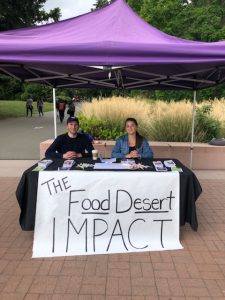Up until this quarter, I had never taken a class that forced students to step outside of the classroom to complete an action project instead of simply writing about it. Many times, we are tasked with finding possible solutions that addresses one of the many problems that are occurring within our community. Yet, the reality is that implementing these solutions is not as easy as it sounds. Not only did this action project teach me about the difficulties of mobilizing different actors to care about a certain issue, it also taught me about group dynamics, and being able to adapt to changes to produce an impactful project.

Our group decide to focus on the topic of food deserts and educate the UW community about how they are affecting communities around King County. While this is an issue that everyone should be aware of, the sad reality is that people who are being affected by these food deserts aren’t aware of its consequences. The limited access to affordable nutritious foods leads to the consumption of processed, cheap foods by certain communities, which can result in health problems that affect the quality of their lives. When looking to fix the high consumption of unhealthy processed foods, such like those being consumed in food deserts, scholars such as Pollan may present a solution that tells consumers to start growing their own produce or to buy from a farmer’s market. Yet these solutions are exactly what is wrong with the approach we are taking. The communities affected by food deserts do not always have the extra time or money to grow their own produce due to socioeconomic class and/or race. Furthermore, what this project taught me is that the best way to start fixing a problem such like food deserts, is to educate and start conversations about the institutional factors standing in the way.
Throughout the course we have continually studied problems that are far from being fixed, but if we choose to ignore the institutions that allow this to occur, there will be no progress. Civil engagement and educating communities within and around these food deserts is a great start, but there is much work to be done.

Hello Sy,
The emphasis on education in your title drew me into reading your article, because I believe education could be the root to future solutions to our global issues. In your blog post, you mentioned that people who are affected by food deserts aren’t correctly informed about its consequences. The global expansion of food allowed food to become incredibly more processed than it should be. Often, people point out mistakes that people make, but don’t suggest any solutions. How do we change then? Being able to contribute ideas and suggestions to the overall problem is with the power of education. I like when you highlighted the importance of smaller-scale farming, which will ultimately benefit the solution.
Hi Sy,
Great reflection over your action project, sounds like you learned a lot. I especially like how you point out the necessity of increasing educational outreach efforts and facilitating discussion with communities impacted by food deserts as the starting point. Too often it seems like people will try to go into communities to fix an issue without actually consulting the community about how they think the problem could be solved. This approach is like telling the community that “we” know better than you, when it comes to solving your problems – when in fact this approach often ignores the various differences in communities. Furthermore, it discourages many community members from participating in things like town hall meetings, etc. Interestingly, research has time and time again indicated and emphasized that the first steps for doing any effective problem-solving for communities requires offering a discursive space for community members to come together and work with whatever group is trying to solve the issue (e.g. local gov., NGOs, etc.). This leads to community empowerment, and any solutions that come about as a result tend to be more widely accepted by the community itself.